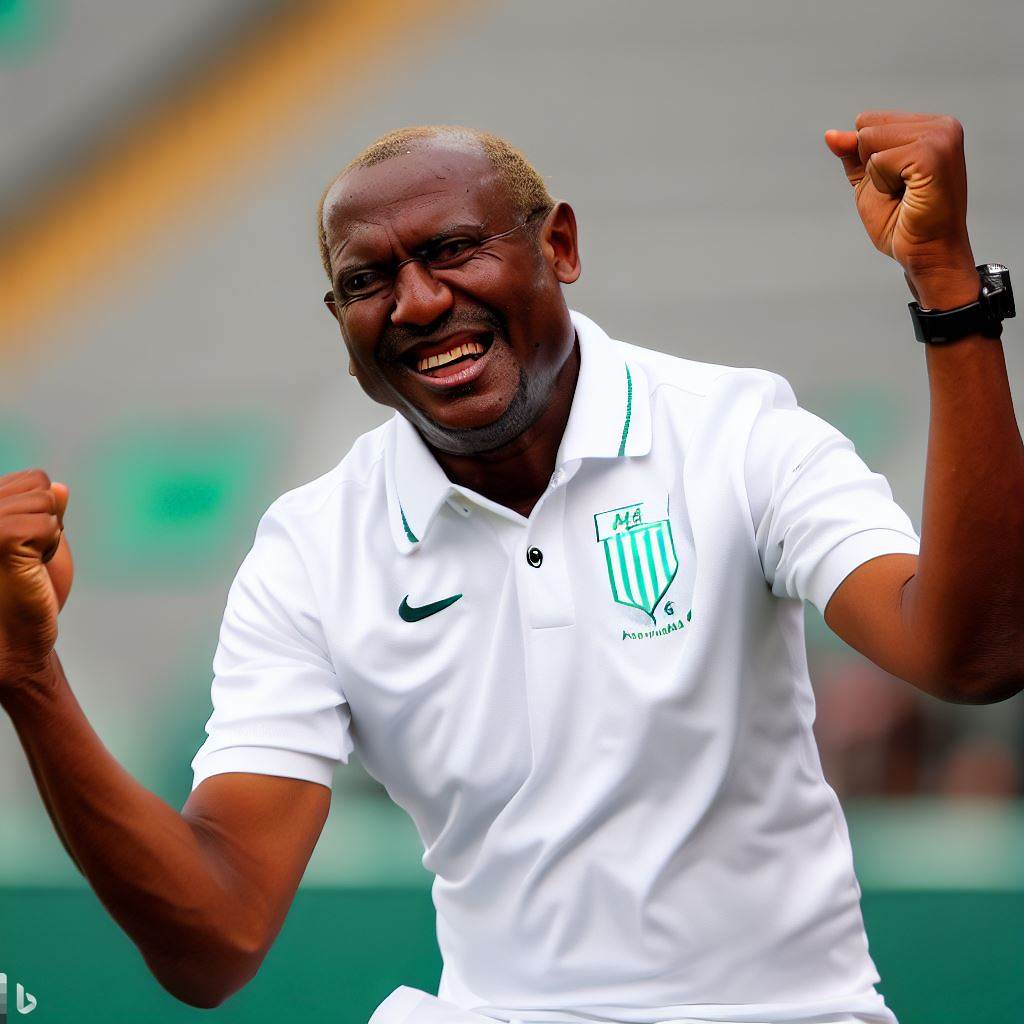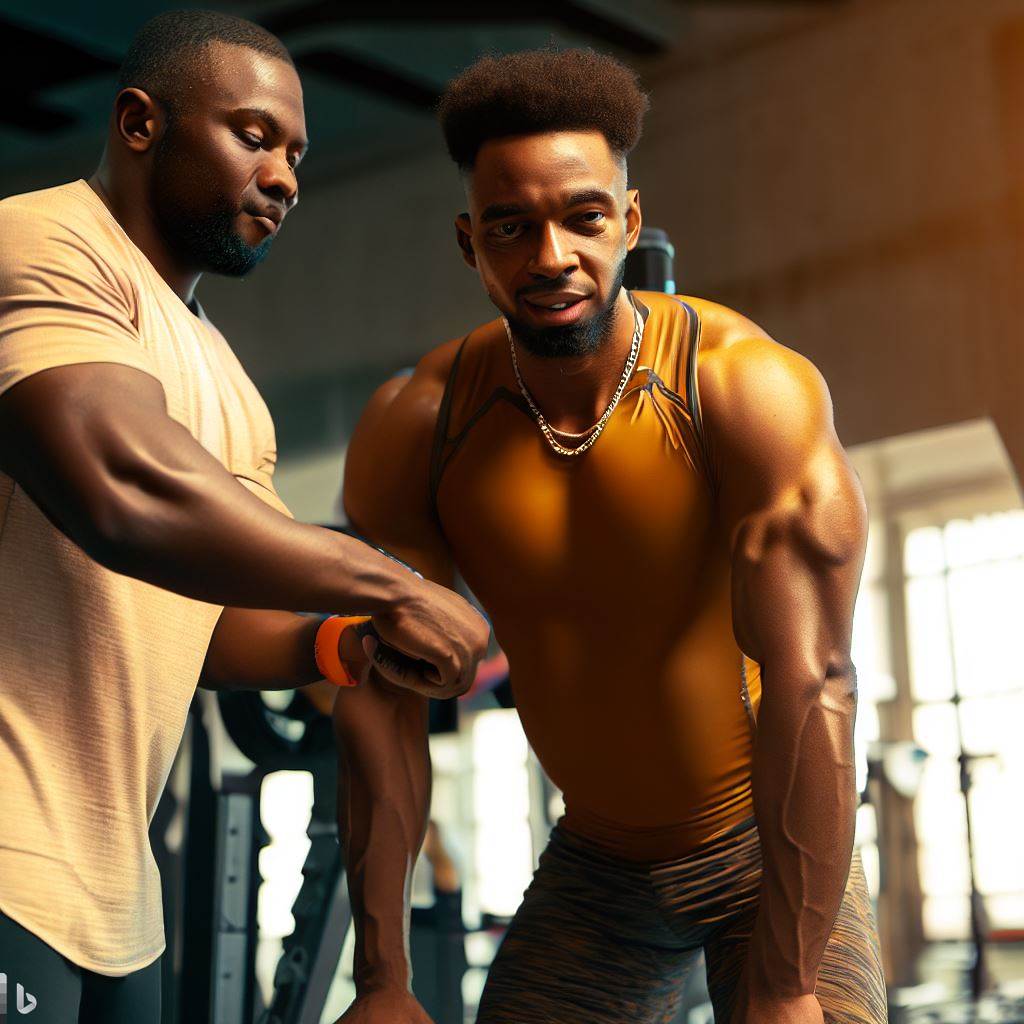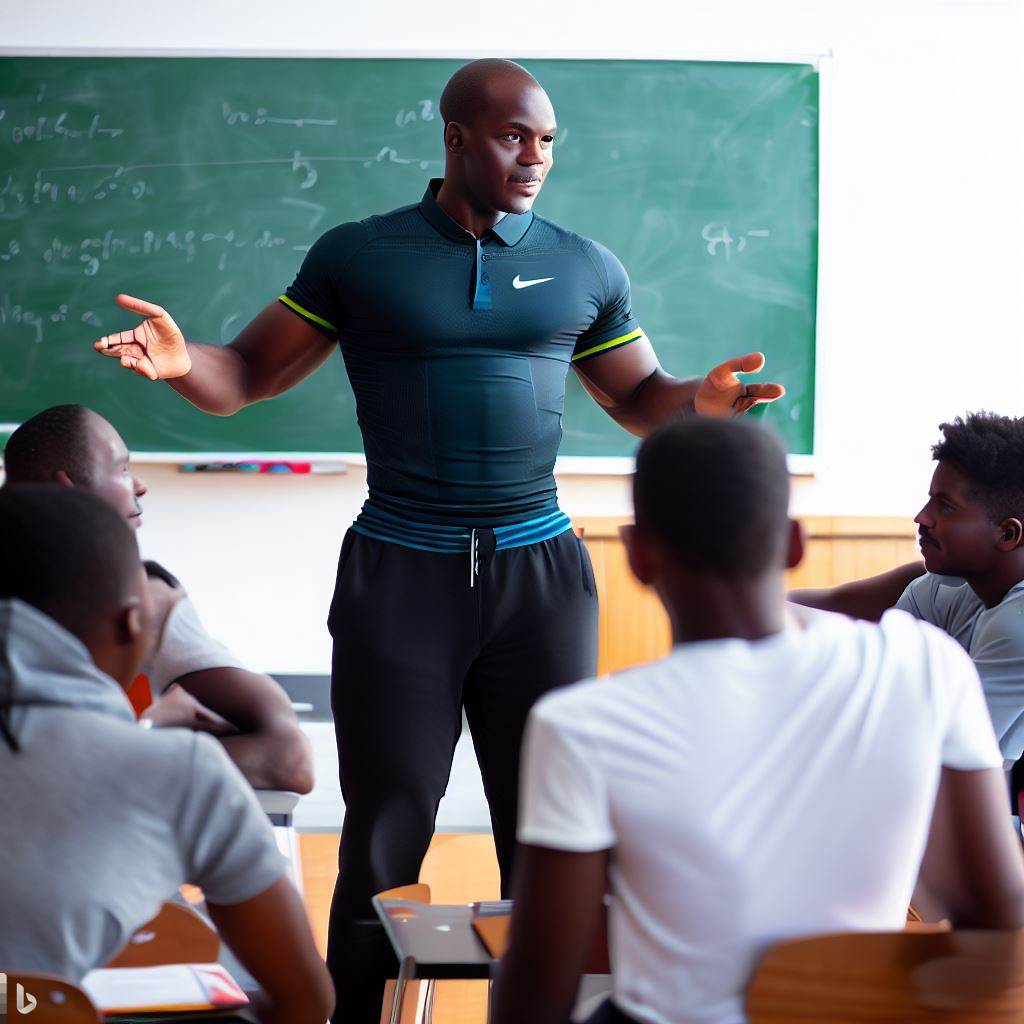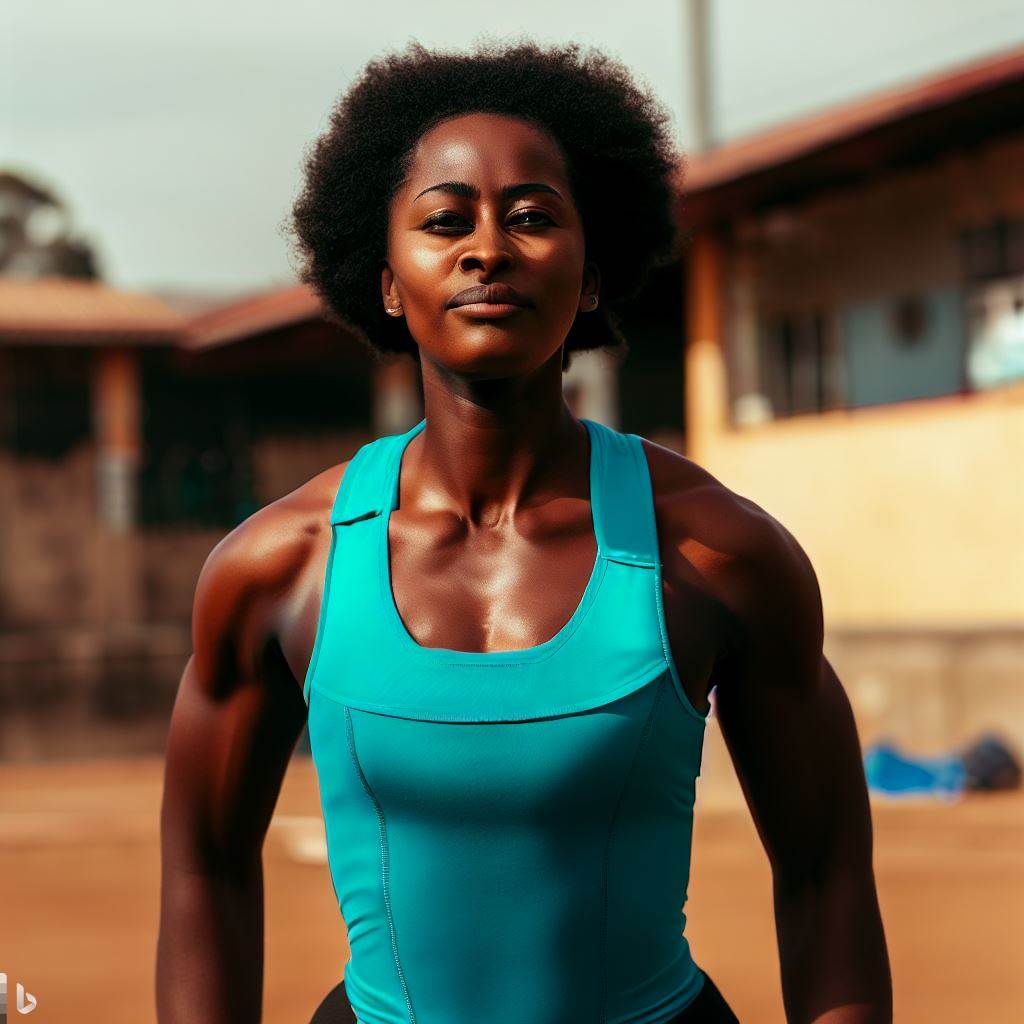Introduction
Athletic trainer equipment plays a crucial role in ensuring the safety and well-being of athletes in Nigeria.
In this article, we will discuss the essential equipment needed by athletic trainers and their significance in preventing and managing sports-related injuries.
Purpose of the article
The purpose of this article is to provide an informative guide on the necessary equipment that athletic trainers in Nigeria should have.
By understanding the importance of these tools, trainers can effectively support athletes and minimize the risk of injuries during training and competitions.
Importance of Athletic Trainer Equipment
In the world of sports, athletic trainers play a crucial role in ensuring the overall well-being and performance of athletes.
However, to effectively carry out their duties, having the right equipment is of utmost importance.
- Ensures Safety: Proper equipment minimizes the risk of injuries and accidents on the field.
- Promotes Efficiency: Having the right tools allows trainers to carry out their tasks effectively and efficiently.
- Aids in Rehabilitation: Equipment such as ultrasound machines and therapy tables assist in the recovery process.
- Increases Accuracy: Tools like tape measures and timers help trainers accurately assess performance and progress.
- Enhances Communication: Equipment like radios and headsets enable trainers to stay connected with coaches and medical professionals.
Significance of Having Proper Equipment for Athletic Trainers in Nigeria
In Nigeria, where sports are greatly loved and celebrated, the importance of proper equipment for athletic trainers cannot be overstated.
- Prevention of Injuries: Adequate equipment helps trainers in identifying and addressing potential issues before they become severe injuries.
- Improved Performance: With the right equipment, trainers can provide athletes with the support they need to reach their full potential.
- Ensuring Fairness: Proper equipment ensures that all athletes have equal access to necessary resources, promoting fair competition.
- Professionalism: Having appropriate equipment enables trainers to carry out their duties in a professional and reputable manner.
How Appropriate Equipment Enhances the Efficiency of Trainers
When athletic trainers in Nigeria have access to the appropriate equipment, their efficiency and effectiveness multiply.
- Time Management: Proper equipment allows trainers to optimize their time and provide timely services to athletes.
- Accurate Diagnosis and Treatment: The use of specialized equipment enables trainers to accurately assess injuries and provide suitable treatment.
- Enhanced Communication: Communication devices grant trainers the ability to coordinate with other personnel, ensuring seamless teamwork.
- Advanced Rehabilitation: With the right tools, trainers can offer advanced and effective rehabilitation programs for injured athletes.
- Building Trust: Having proper equipment strengthens the trust and confidence athletes have in their trainers.
It is evident that having the right equipment is crucial for athletic trainers in Nigeria.
Not only does it ensure the safety and well-being of athletes, but it also enhances the trainers’ efficiency and effectiveness.
Therefore, investing in appropriate equipment is essential to promote excellence in sports and provide athletes with the care they deserve.
Read: Career Growth in Athletic Training in Nigeria: A Detailed Look
Basic Athletic Trainer Equipment
Athletic trainers play a crucial role in the health and well-being of athletes. In Nigeria, where sports are a passion and a source of national pride, having the right equipment is essential.
Here’s a list of basic athletic trainer equipment every professional in Nigeria should have:
1. First Aid Kit
- Purpose: Immediate care for minor injuries, cuts, and bruises.
- Usage: Clean and disinfect wounds, apply bandages, and manage minor injuries.
- Example: Sterile gauze, adhesive tape, antiseptic wipes.
2. Automated External Defibrillator (AED)
- Purpose: To treat sudden cardiac arrest.
- Usage: Provides an electric shock to restore normal heart rhythm.
- Example: Portable AED device with pads and instructions.
3. Ice Packs
- Purpose: Reduce inflammation and pain in injured areas.
- Usage: Apply to injuries like sprains or strains to minimize swelling.
- Example: Reusable ice packs or instant cold packs.
4. Thermometer
- Purpose: Monitor body temperature for signs of fever or overheating.
- Usage: Place under the tongue or in the ear to measure temperature accurately.
- Example: Digital thermometer with disposable probe covers.
5. Compression Wraps
- Purpose: Provide support and reduce swelling in injured joints.
- Usage: Apply to injured areas to stabilize and compress injuries.
- Example: Elastic bandages or compression sleeves.
6. Splinting Materials
- Purpose: Immobilize fractures or dislocated joints before medical help arrives.
- Usage: Create makeshift splints to prevent further injury during transport.
- Example: Padded board or rolled newspaper.
7. Sports Tape
- Purpose: Support and stabilize joints and muscles.
- Usage: Apply to ankles, wrists, or other areas prone to injury.
- Example: Athletic tape or kinesiology tape.
8. Scissors
- Purpose: Safely cut tape, bandages, and clothing if needed.
- Usage: Ensure quick access to the injured area and prevent further harm.
- Example: Medical scissors with rounded tips.
9. CPR Face Shield
- Purpose: Protect both the trainer and the injured person during CPR.
- Usage: Place over the mouth and nose during rescue breaths.
- Example: Disposable CPR face shield with one-way valve.
10. Disposable Gloves
- Purpose: Prevent the spread of infection and maintain hygiene.
- Usage: Wear when treating open wounds or coming into contact with bodily fluids.
- Example: Nitrile or latex gloves in various sizes.
11. Pain Relievers and Medications
- Purpose: Provide immediate relief for minor aches and pains.
- Usage: Administer over-the-counter pain relievers when appropriate.
- Example: Acetaminophen or ibuprofen.
Having these basic athletic trainer equipment items readily available is essential for any sports event or training session in Nigeria.
These tools enable athletic trainers to respond swiftly and effectively to injuries, ensuring the well-being of athletes and promoting safe and successful sports participation.
Read: Ethics and Professionalism in Athletic Training in Nigeria
Specialized Athletic Trainer Equipment
Athletic trainers in Nigeria must possess essential equipment.
This gear varies by sport and aids injury prevention and treatment.
Ankle braces offer stability in football, basketball, and tennis, reducing the risk of further injury.
Concussion assessment tools, including cognitive tests, balance tests, and symptom checklists, are crucial for various sports.
Taping supplies, like rigid, elastic, and kinesiology tape, support joints like wrists, ankles, and knees in injuries.
Hydration equipment, such as water bottles and coolers, maintains optimal performance and prevents heat-related illnesses.
Injury prevention tools like foam rollers and resistance bands improve flexibility and strength.
Emergency response gear like first aid kits, ice packs, splints, and AEDs ensures immediate care in crises.
Rehabilitation equipment, such as exercise machines and therapy tools, aids athletes’ recovery from injuries.
Sport-specific equipment, e.g., shoulder pads and helmets for football or height measurement tools for basketball, is sport-specific.
In Nigeria, well-equipped athletic trainers ensure athletes’ well-being and performance, preventing and managing sports injuries effectively.
Read: Roles and Responsibilities of Athletic Trainers in Nigeria
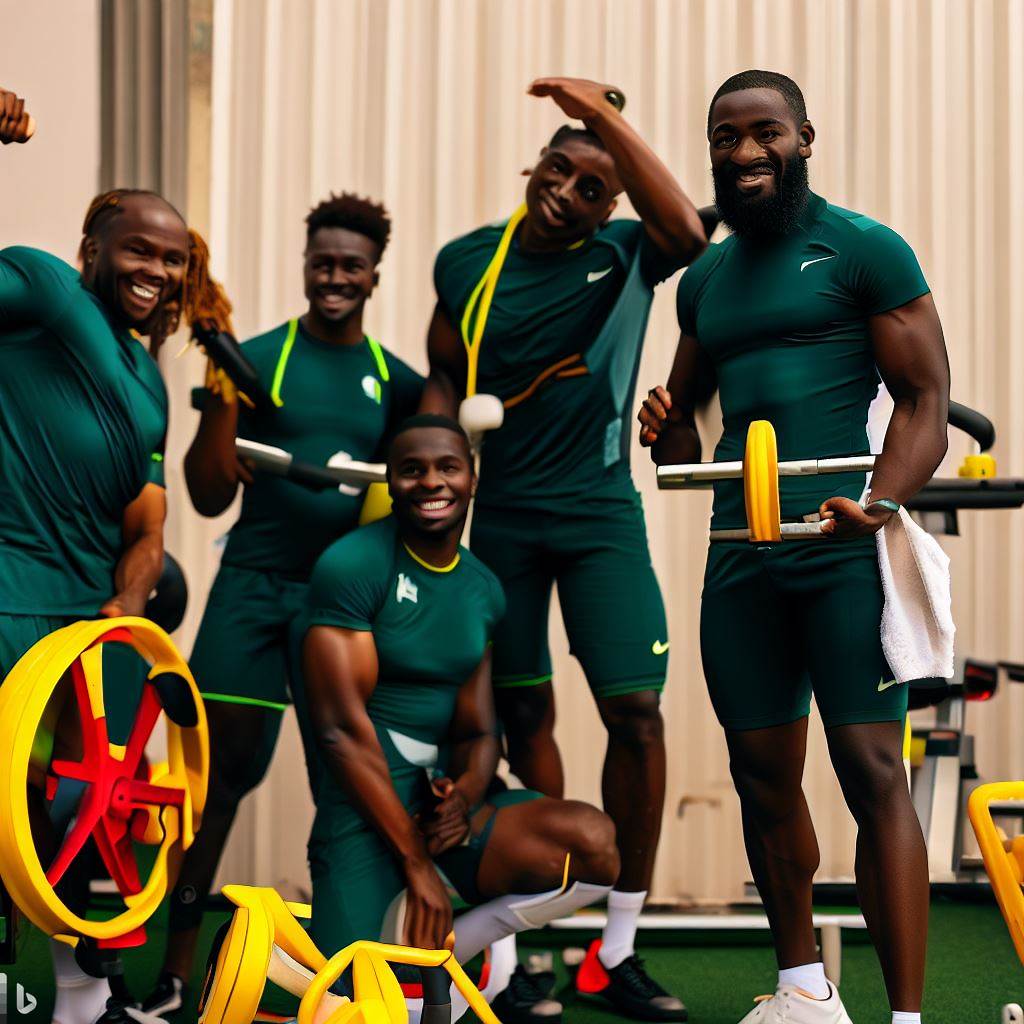
Gain More Insights: Careers Behind the Scenes in Nigeria’s Sports Industry
Challenges of Acquiring Athletic Trainer Equipment in Nigeria
In Nigeria, obtaining athletic trainer equipment can be a challenge due to various factors.
This article will identify the difficulties faced in obtaining quality equipment, discuss the economic factors that hinder access, and mention potential alternatives or solutions to overcome these challenges.
- Limited availability of quality equipment
- Lack of standardized equipment procurement process
- Inadequate distribution channels for equipment
- High cost of importing equipment
- Low budgetary allocation for sports equipment
A. Difficulties Faced in Obtaining Quality Equipment
- Limited number of suppliers offering high-quality athletic trainer equipment
- Lack of proper quality control measures for equipment
- Absence of comprehensive equipment testing facilities
- Insufficient knowledge about the specific equipment requirements for different sports
- Difficulty in determining the authenticity and durability of equipment
B. Economic Factors that Hinder Access to Equipment
- Exchange rate fluctuations affecting equipment prices
- High import duties and taxes imposed on equipment
- Unstable economy leading to reduced purchasing power
- Limited investment in sports infrastructure and equipment development
- Lack of funding for sports programs and equipment procurement
C. Potential Alternatives or Solutions to Overcome these Challenges
- Encouraging local production of athletic trainer equipment to reduce dependence on imports
- Promoting public-private partnerships to improve funding for sports programs and equipment procurement
- Establishing quality control bodies to ensure the standardization and certification of equipment
- Engaging international organizations and donors to provide support and funding for sports equipment
- Increasing budgetary allocation for sports equipment to meet the demand and availability of quality equipment
Acquiring athletic trainer equipment in Nigeria comes with various challenges, including limited availability, economic factors, and difficulties in obtaining quality equipment.
However, potential solutions such as local production, public-private partnerships, and increased funding can help overcome these challenges and ensure better access to quality equipment for athletes and trainers in Nigeria.
By addressing the challenges and implementing the mentioned solutions, Nigeria can improve its sports infrastructure and equipment procurement system, thereby enhancing athlete performance and promoting sports development in the country.
Read: How to Get Certified as an Athletic Trainer in Nigeria
Promoting Athletic Trainer Equipment in Nigeria
Athletic trainer equipment plays a crucial role in ensuring the safety and performance of athletes.
In Nigeria, where sports are gaining more popularity, it is important to focus on enhancing the availability and quality of athletic trainer equipment.
This section explores the importance of advocacy and support for improving athletic trainer equipment in Nigeria, mentions organizations and government bodies working towards this goal, and encourages partnerships and collaborations for widespread access to equipment.
A. Advocacy and Support: Enhancing Athletic Trainer Equipment
Advocacy and support are crucial for promoting the enhancement of athletic trainer equipment in Nigeria.
By advocating for better equipment, we can ensure the well-being and success of athletes participating in various sports activities.
- Advocacy helps raise awareness about the importance of quality athletic trainer equipment.
- Support from stakeholders, including sporting federations, governments, and the public, strengthens the drive for improvement.
With proper advocacy and support, the overall athletic trainer equipment standards can be improved, benefitting both professional and recreational athletes.
B. Organizations, Government Bodies, and Initiatives
Efforts to improve access to athletic trainer equipment in Nigeria are being made by various organizations, government bodies, and initiatives.
These entities play a significant role in driving change and ensuring the availability of high-quality equipment.
- The Nigerian Sports Ministry actively supports initiatives to enhance athletic trainer equipment across the country.
- Organizations like the Nigeria Olympic Committee work towards improving the standards of athletic trainer equipment.
- The Athletic Trainers Association of Nigeria (ATAN) collaborates with stakeholders to advocate for better equipment and provide educational resources to trainers.
These organizations and initiatives are at the forefront of promoting better equipment and ensuring the athletic trainers have access to the necessary tools for their profession.
C. Encouraging Partnerships and Collaborations
Promoting the availability of athletic trainer equipment requires partnerships and collaborations between various entities.
These cooperative efforts can create a synergistic relationship, leading to better access and utilization of equipment.
- Encouraging partnerships between sporting associations and equipment manufacturers can lead to the development of affordable, locally sourced equipment.
- Schools and universities can collaborate with organizations to improve their athletic trainer equipment facilities.
- Government bodies can form collaborations with non-profit organizations to implement training programs on equipment usage and maintenance.
These partnerships and collaborations can contribute to the overall improvement of athletic trainer equipment in Nigeria, ensuring its availability and proper utilization.
Advocacy, support, and collaborations are essential for promoting the availability and quality of athletic trainer equipment in Nigeria.
By working together, we can enhance the standards of equipment, ensuring the safety and success of athletes across the country.
Through the efforts of organizations, government bodies, and collaborations, athletes and trainers will have access to the necessary equipment, providing them with the tools they need to excel in their sports and improve their overall performance.
Let us join hands and support the enhancement of athletic trainer equipment in Nigeria.
Conclusion
Having proper athletic trainer equipment in Nigeria is of utmost importance. It not only ensures the safety of athletes but also enhances their performance.
By providing the necessary tools and resources, athletes can train effectively and prevent injuries.
The impact of having adequate athletic trainer equipment on athlete safety and performance cannot be overstated.
It enables trainers to assess and treat injuries promptly, reducing the risk of further complications.
Additionally, proper equipment allows athletes to train in a controlled and supportive environment, maximizing their potential.
To make a difference, it is essential for readers to take action.
Supporting initiatives that promote the availability of athletic trainer equipment in Nigeria is one way to contribute.
Donating to organizations that provide resources and training opportunities for trainers can go a long way in improving athlete care.
Furthermore, spreading awareness about the significance of athletic trainer equipment is crucial.
Sharing information through social media, organizing events, or engaging in discussions can help educate others about the topic.
By creating a collective voice, we can advocate for the importance of proper equipment and push for positive change.
To summarize, the need for athletic trainer equipment in Nigeria cannot be ignored. It is essential for the safety and performance of athletes.
Let’s come together to support initiatives and spread awareness, ensuring that all athletes have access to the necessary tools for success.

